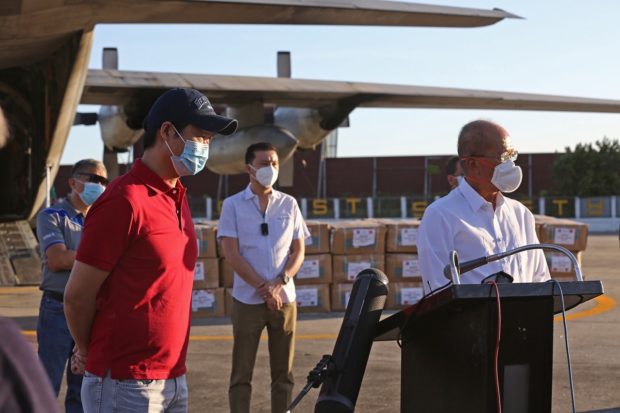
DONATION Members of the Gatchalian family, joined by Defense Secretary Delfin Lorenzana, witness the turnover of P30 million worth of personal protective equipment and other medical supplies that the family donated onMonday to the National Task Force COVID-19, which Lorenzana heads. —CONTRIBUTED PHOTO
MANILA, Philippines — A group advocating nurses’ rights urged the Department of Health (DOH) on Monday to speed up the hiring of additional health-care workers, saying that a personnel shortage was putting medical front-liners at greater risk of contracting the coronavirus disease (COVID-19).
The Filipino Nurses United (FNU) expressed concern that the staffing shortage was making health-care workers more prone to COVID-19 as some of them were made to work for 12 hours while wearing restrictive safety gear.
Long hours
“Long hours of duty make them more vulnerable to COVID-19 and other diseases due to a weakened immune system. Wearing personal protective equipment (PPE) for 12 hours, likewise, puts them in danger of suffocation, exhaustion and dehydration because of the extreme heat from the coveralls, which compromises breathing,” said FNU president Maristela Abenojar.
As of Sunday, the DOH has received requests for additional staff from 22 hospitals and quarantines. Vergeire said that so far the agency had approved the hiring of 984 health workers.
Of this, 296 have been deployed, of which more than half are at the Research Institute for Tropical Medicine (RITM).
Vergeire added that the DOH also gave RITM an additional budget of P7.9 million to hire 22 employees.
From their nurse deployment program, Vergeire said that they redeployed 626 nurses, 431 of whom are in the Visayas and Mindanao.
On Monday, Health Undersecretary Maria Rosario Vergeire said 1,245 health-care workers had tested positive for COVID-19. Of the total, 471 were nurses, 464 were doctors, 69 were nursing assistants, 41 were medical technologists, 25 were radiologic technologists, and 10 were midwives.
Health-care workers now account for 16 percent of the 7,777 COVID-19 cases in the country. To date, 21 doctors and six nurses have died of the disease.
The World Health Organization has expressed alarm over the “very worrisome” uptrend of medical front-liners infected with the virus. Last week, 13 percent of the Philippines’ confirmed cases were health workers, or at least four times higher than the 2 to 3 percent average infection rate recorded in the 22-member Western Pacific region.
In China, where the virus originated, infection among health-care workers was 4 percent at its peak.
In Great Britain, 19,000 Filipino nurses who are taking care of COVID-19 patients confront a similar problem as their compatriots: inadequate PPE.
At least 20 Filipinos have died while on medical duty, prompting the Philippine Embassy in London to raise the Filipino nurses’ demand for PPE to the British government.
Foreign Secretary Teodoro Locsin Jr. said his British counterpart committed that the United Kingdom would “take better care” of the Filipino workers.
He said British Foreign Secretary Dominic Raab called him on Sunday, expressing gratitude to the Filipino health-care workers and “sincerest condolences for loss of so many.”
“England will take better care of them,” Locsin tweeted.
Vertigo, electrolyte imbalance
Abenojar said FNU had received reports that some health-care workers in the country were suffering from vertigo, electrolyte imbalance or low potassium levels due to “severe perspiration.”
This is why the DOH should expedite its hiring of health workers so hospitals can strictly implement the eight-hour shift, she said, given the continued increase in the number of infected medical front-liners.
Earlier, a 12-member Chinese medical team that visited the country to assess DOH’s COVID-19 response suggested that nurses assigned to intensive care units should just work for four hours, while those in regular wards, six to eight hours.
This setup helps reduce the opportunity for a breach in the PPE and provides some comfort for users.
Abenojar acknowledged, though, that the “chronic understaffing” could make the four-hour shift difficult to implement.
Vergeire had said the health department would look into the work schedule of the front-liners.
She pointed out that the agency was already working to deploy an additional 15,000 health-care workers under its emergency hiring program.—WITH A REPORT FROM DONA Z. PAZZIBUGAN INQ